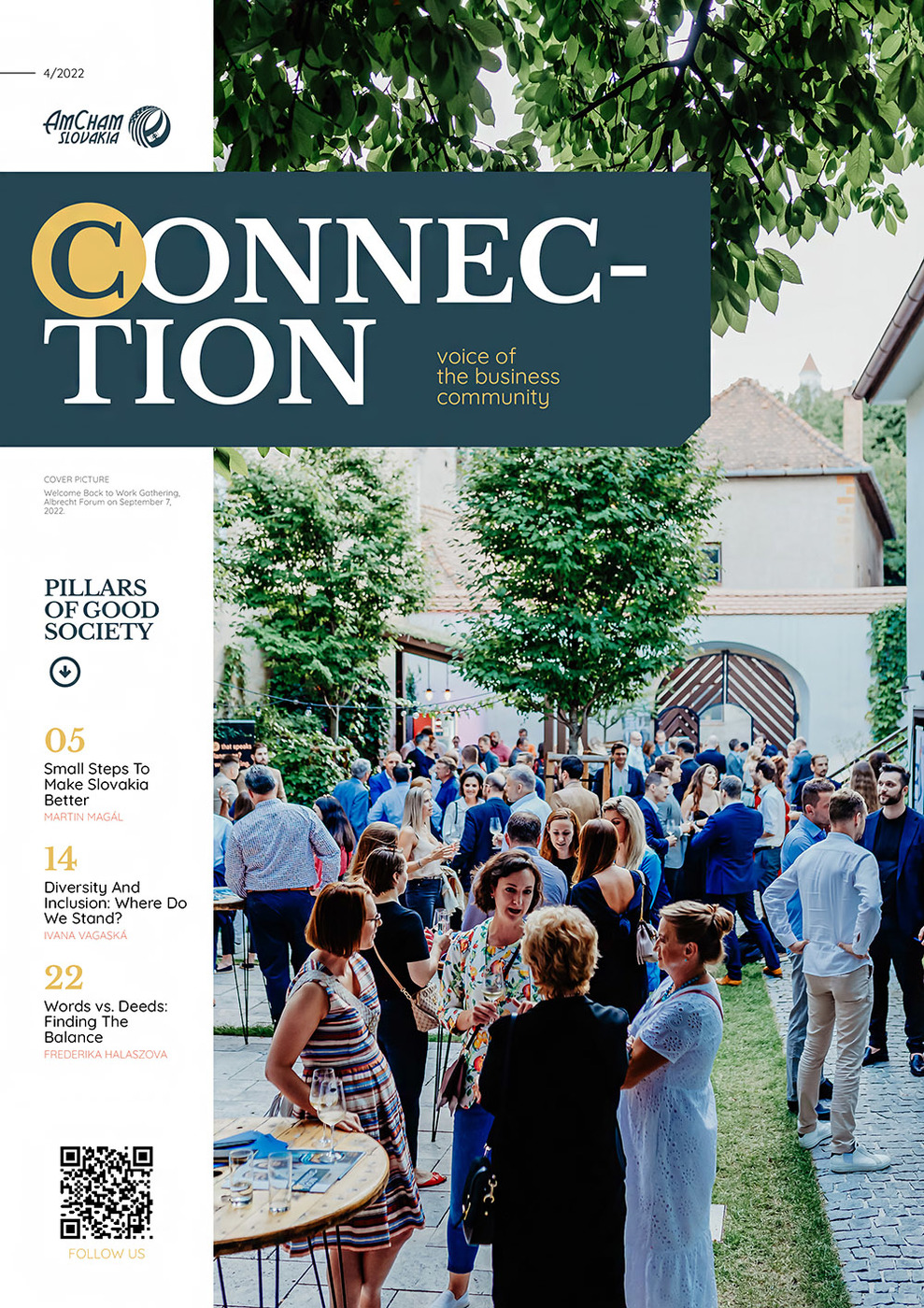Legal regulations in a democratic country represent a form of social contract. In order for legal regulations to be respected and accepted, they should be designed in a way that inspires confidence. Only a proposal that passes scrutiny within a standard legislative process can, in addition to being formally binding, enjoy the goodwill of the society. I am not happy that far-reaching changes are being adopted in Slovakia without proper discussion. This is one reason why AmCham is involved in the Rule of Law Initiative.
The Initiative is apolitical and strives to ensure that purity of the legislative process is observed under all circumstances. If we, as the very users of legal regulations, speak up because we are not satisfied with how legislative activity is carried out, then we are sending a signal to government institutions to stop such practices. Nowadays, on behalf of the Initiative, we are preparing an amicus curiae brief for the Constitutional Court in connection with proceedings concerning the constitutionality of the approval of the so-called “anti-inflation package“.
 The Rule of Law Initiative also recently issued specific proposals on improving the transparency of selection procedures for regulatory and supervisory bodies. I wish that the selection procedures were truly transparent, so that the public, both professionals and laypeople, could participate in them, and for the candidates to be subjected to testing their personality, character, and communication skills. I don’t think that Slovakia has a problem with poor legislation. Instead, I see the biggest shortcoming in the subjectivity applied when implementing legal regulations. In other words, people are the problem.
The Rule of Law Initiative also recently issued specific proposals on improving the transparency of selection procedures for regulatory and supervisory bodies. I wish that the selection procedures were truly transparent, so that the public, both professionals and laypeople, could participate in them, and for the candidates to be subjected to testing their personality, character, and communication skills. I don’t think that Slovakia has a problem with poor legislation. Instead, I see the biggest shortcoming in the subjectivity applied when implementing legal regulations. In other words, people are the problem.
Although it may seem that we are currently watching the moral decline of Slovakia, I do not see it that way. Yes, we live in difficult times, but there is still hope. If we want to change society, it is necessary to start with ourselves. Sometimes it takes very little effort – such as going to a library.
My colleague was recently travelling by train with a book in her hand, and a sympathetic senior spoke to her: “That’s great that you’re reading a book. I rarely see people read like this. The other day I saw a boy of about twelve years. He was holding a thick book in his hand and was already about halfway through. I asked him if he really read that much. He looked at me in surprise and nodded in agreement. I gave him a candy out of joy.” Their conversation turned to books, but they mainly discussed why reading is important. It turned out that he was a Slovak novelist, a regular contributor to a literary weekly paper. When she told me this story, I realized how much better this society would be if we just read more.
 I reminisced about the books that resonated with me over the years. Although I do not remember much about the stories themselves, I remember very clearly the atmosphere and the emotions that overwhelmed me when I finished reading good books. In my thoughts, I also returned to those books that I could not finish reading at first and had to put them aside for several months. It was only when I calmed down internally that I was able to immerse myself in the story. I was able to focus on the plot, uncover the beauty of the language, and appreciate the subtle descriptions. What a shame it would be if I had not given these books a second chance and let them sit on a shelf unread. Some of them are real gems.
I reminisced about the books that resonated with me over the years. Although I do not remember much about the stories themselves, I remember very clearly the atmosphere and the emotions that overwhelmed me when I finished reading good books. In my thoughts, I also returned to those books that I could not finish reading at first and had to put them aside for several months. It was only when I calmed down internally that I was able to immerse myself in the story. I was able to focus on the plot, uncover the beauty of the language, and appreciate the subtle descriptions. What a shame it would be if I had not given these books a second chance and let them sit on a shelf unread. Some of them are real gems.
Reading books regularly has had positive effects on my well-being. Books make me calmer and help me slow down a bit. Not to mention that reading is an adventure, a journey and an enrichment all in one. But most importantly, books teach me to be empathetic. The pillars of a good society should, in my opinion, be resting on stacks of books.
Martin Magál, First vice-president AmCham Slovakia and Managing Partner Allen & Overy Bratislava



Follow us